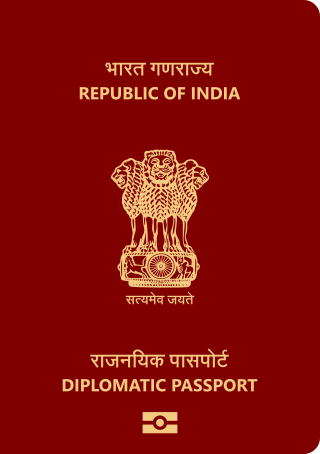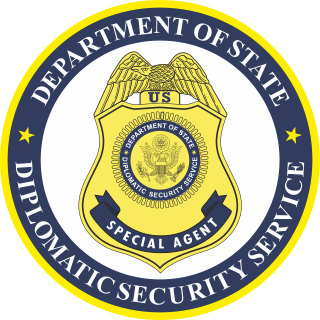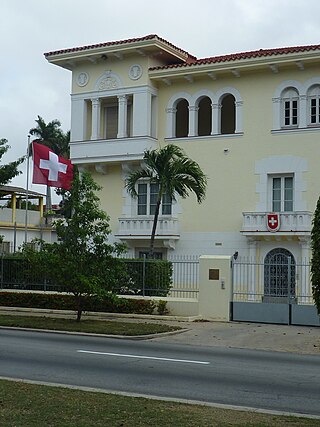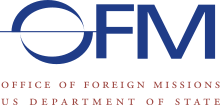
Diplomatic immunity is a principle of international law by which certain foreign government officials are recognized as having legal immunity from the jurisdiction of another country. It allows diplomats safe passage and freedom of travel in a host country and affords almost total protection from local lawsuits and prosecution.

A diplomatic mission or foreign mission is a group of people from a state or organization present in another state to represent the sending state or organization officially in the receiving or host state. In practice, the phrase usually denotes an embassy or high commission, which is the main office of a country's diplomatic representatives to another country; it is usually, but not necessarily, based in the receiving state's capital city. Consulates, on the other hand, are smaller diplomatic missions that are normally located in major cities of the receiving state. As well as being a diplomatic mission to the country in which it is situated, an embassy may also be a nonresident permanent mission to one or more other countries.

The United States Department of State (DOS), or simply the State Department, is an executive department of the U.S. federal government responsible for the country's foreign policy and relations. Equivalent to the ministry of foreign affairs of other nations, its primary duties are advising the U.S. president on international relations, administering diplomatic missions, negotiating international treaties and agreements, and representing the U.S. at the United Nations. The department is headquartered in the Harry S Truman Building, a few blocks from the White House, in the Foggy Bottom neighborhood of Washington, D.C.; "Foggy Bottom" is thus sometimes used as a metonym.

A diplomat is a person appointed by a state, intergovernmental, or nongovernmental institution to conduct diplomacy with one or more other states or international organizations.
The Burlingame Treaty, also known as the Burlingame–Seward Treaty of 1868, was a landmark treaty between the United States and Qing China, amending the Treaty of Tientsin, to establish formal friendly relations between the two nations, with the United States granting China the status of most favored nation with regards to trade. It was signed in the capital of the United States, Washington, D.C. in 1868 and ratified in Peking in 1869. The most significant result of the treaty was that it effectively lifted any former restrictions in regards to emigration to the United States from China, with large-scale immigration to the United States beginning in earnest by Chinese immigrants.

The United States Foreign Service is the primary personnel system used by the diplomatic service of the United States federal government, under the aegis of the United States Department of State. It consists of over 13,000 professionals carrying out the foreign policy of the United States and aiding U.S. citizens abroad. Its current director general is Marcia Bernicat.

The United States Department of State Bureau of Overseas Buildings Operations (OBO) is responsible for overseeing the construction, management, and operations of U.S. diplomatic facilities around the world.

The Bureau of Diplomatic Security, commonly known as Diplomatic Security (DS), is the security branch of the United States Department of State. It conducts international investigations, threat analysis, cyber security, counterterrorism, and protection of people, property, and information. Its mission is to provide a safe and secure environment for officials to execute the foreign policy of the United States.

The Diplomatic Security Service (DSS) is the principal security and law enforcement agency of the United States Department of State (DOS). As the operational division of DOS Bureau of Diplomatic Security, its primary mission is to provide security to protect diplomatic assets, personnel, and information, and combat visa and passport fraud. DSS also conducts counterterrorism, counterintelligence, cybersecurity and criminal investigations domestically and abroad.
Diplomatic rank is a system of professional and social rank used in the world of diplomacy and international relations. A diplomat's rank determines many ceremonial details, such as the order of precedence at official processions, table seatings at state dinners, the person to whom diplomatic credentials should be presented, and the title by which the diplomat should be addressed.

A consul is an official representative of a government who resides in a foreign country to assist and protect citizens of the consul's country, and to promote and facilitate commercial and diplomatic relations between the two countries.
Diplomatic law is that area of international law that governs permanent and temporary diplomatic missions. A fundamental concept of diplomatic law is that of diplomatic immunity, which derives from state immunity.

The Embassy of the United States of America in Baghdad is the diplomatic mission of the United States of America in the Republic of Iraq. Ambassador Alina Romanowski is currently the chief of mission.

A consulate is the office of a consul. A type of diplomatic mission, it is usually subordinate to the state's main representation in the capital of that foreign country, usually an embassy. The term "consulate" may refer not only to the office of a consul, but also to the building occupied by the consul and the consul's staff. The consulate may share premises with the embassy itself.

The Ministry of Foreign Affairs of the People's Republic of China is the first-ranked executive department of the State Council of the People's Republic of China, responsible for the country's foreign relations. It is led by the minister of foreign affairs, currently Wang Yi, who serves as the nation's principal representative abroad. The ministry is headquartered in Chaoyang District, Beijing, the country's primary diplomatic quarter.

Mobile Security Deployments (MSD) is a small specialized tactical unit within the Diplomatic Security Service (DSS) of the United States Department of State. The MSD provides U.S. embassies and consulates with security support, protects the Secretary of State and other U.S. officials, including domestically as well as visiting foreign officials, and also provides security training at U.S embassies and consulates.

A protecting power is a country that represents another sovereign state in a country where it lacks its own diplomatic representation. It is common for protecting powers to be appointed when two countries break off diplomatic relations with each other. The protecting power is responsible for looking after the protected power's diplomatic property and citizens in the hosting state. If diplomatic relations were broken by the outbreak of war, the protecting power will also inquire into the welfare of prisoners of war and look after the interests of civilians in enemy-occupied territory.

A chancery is the principal office that houses a diplomatic mission or an embassy. This often includes the associated building and the site. The building can house one or several different nations' missions. The term derives from chancery or chancellery, the office of a chancellor. Some nations title the head of foreign affairs a chancellor, and 'chancery' eventually became a common referent to the main building of an embassy.
On December 11, 2013, Devyani Khobragade, then the Deputy Consul General of the Consulate General of India in New York City, was charged by U.S. authorities with committing visa fraud and providing false statements in order to gain entry to the United States for Sangeeta Richard, a woman of Indian nationality, for employment as a domestic worker for Khobragade in New York. She was additionally charged with failing to pay the domestic worker a minimum wage.
The Diplomatic Service of the Republic of Lithuania is the part of the governmental service tasked with enforcing the foreign policy set by the President, the Parliament, and the Government of the Republic of Lithuania. The head of the service is the Foreign Minister.

















